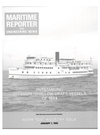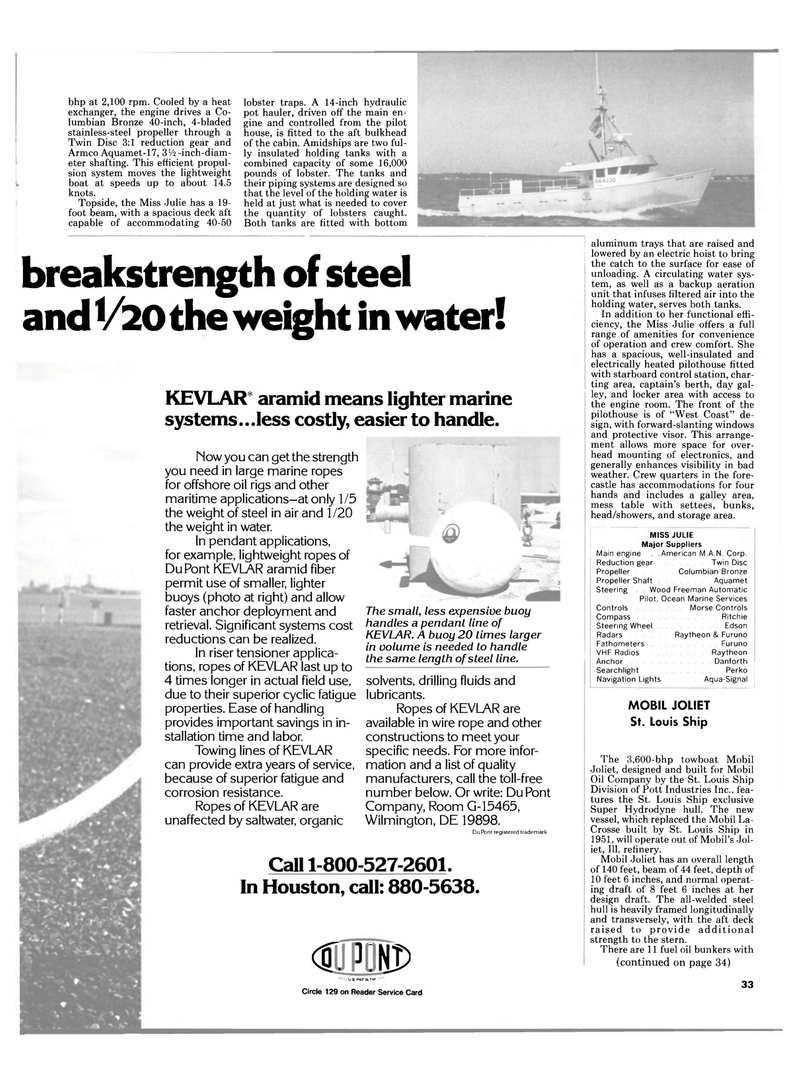
Page 33: of Maritime Reporter Magazine (January 1985)
Read this page in Pdf, Flash or Html5 edition of January 1985 Maritime Reporter Magazine
bhp at 2,100 rpm. Cooled by a heat exchanger, the engine drives a Co- lumbian Bronze 40-inch, 4-bladed stainless-steel propeller through a
Twin Disc 3:1 reduction gear and
Armco Aquamet-17, 3 Vi -inch-diam- eter shafting. This efficient propul- sion system moves the lightweight boat at speeds up to about 14.5 knots.
Topside, the Miss Julie has a 19- foot beam, with a spacious deck aft capable of accommodating 40-50 lobster traps. A 14-inch hydraulic pot hauler, driven off the main en- gine and controlled from the pilot house, is fitted to the aft bulkhead of the cabin. Amidships are two ful- ly insulated holding tanks with a combined capacity of some 16,000 pounds of lobster. The tanks and their piping systems are designed so that the level of the holding water is held at just what is needed to cover the quantity of lobsters caught.
Both tanks are fitted with bottom breakstrength of steel and 1/20 the weight in water!
KEVLAR aramid means lighter marine systems...less costly, easier to handle.
Now you can get the strength you need in large marine ropes for offshore oil rigs and other maritime applications-at only 1/5 the weight of steel in air and 1/20 the weight in water.
In pendant applications, for example, lightweight ropes of
DuPont KEVLAR aramid fiber permit use of smaller, lighter buoys (photo at right) and allow faster anchor deployment and retrieval. Significant systems cost reductions can be realized.
In riser tensioner applica- tions, ropes of KEVLAR last up to 4 times longer in actual field use, due to their superior cyclic fatigue properties. Ease of handling provides important savings in in- stallation time and labor.
Towing lines of KEVLAR can provide extra years of service, because of superior fatigue and corrosion resistance.
Ropes of KEVLAR are unaffected by saltwater, organic
The small, less expensive buoy handles a pendant line of
KEVLAR. A buoy 20 times larger in volume is needed to handle the same length of steel line. solvents, drilling fluids and lubricants.
Ropes of KEVLAR are available in wire rope and other constructions to meet your specific needs. For more infor- mation and a list of quality manufacturers, call the toll-free number below. Or write: Du Pont
Company, Room G-15465,
Wilmington, DE 19898. " Du Pont registered trademark
Call 1-800-527-2601.
In Houston, call: 880-5638. mm aluminum trays that are raised and lowered by an electric hoist to bring the catch to the surface for ease of unloading. A circulating water sys- tem, as well as a backup aeration unit that infuses filtered air into the holding water, serves both tanks.
In addition to her functional effi- ciency, the Miss Julie offers a full range of amenities for convenience of operation and crew comfort. She has a spacious, well-insulated and electrically heated pilothouse fitted with starboard control station, char- ting area, captain's berth, day gal- ley, and locker area with access to the engine room. The front of the pilothouse is of "West Coast" de- sign, with forward-slanting windows and protective visor. This arrange- ment allows more space for over- head mounting of electronics, and generally enhances visibility in bad weather. Crew quarters in the fore- castle has accommodations for four hands and includes a galley area, mess table with settees, bunks, head/showers, and storage area.
MISS JULIE
Major Suppliers
Main engine . .American M.A.N. Corp.
Reduction gear Twin Disc
Propeller Columbian Bronze
Propeller Shaft Aquamet
Steering . . Wood Freeman Automatic
Pilot, Ocean Marine Services
Controls Morse Controls
Compass Ritchie
Steering Wheel Edson
Radars Raytheon & Furuno
Fathometers Furun
VHF Radios Raytheon
Anchor Danforth
Searchlight Perko
Navigation Lights Aqua-Signal
MOBIL JOLIET
St. Louis Ship
The 3,600-bhp towboat Mobil
Joliet, designed and built for Mobil
Oil Company by the St. Louis Ship
Division of Pott Industries Inc., fea- tures the St. Louis Ship exclusive
Super Hydrodyne hull. The new vessel, which replaced the Mobil La-
Crosse built by St. Louis Ship in 1951, will operate out of Mobil's Jol- iet, 111. refinery.
Mobil Joliet has an overall length of 140 feet, beam of 44 feet, depth of 10 feet 6 inches, and normal operat- ing draft of 8 feet 6 inches at her design draft. The all-welded steel hull is heavily framed longitudinally and transversely, with the aft deck raised to provide additional strength to the stern.
There are 11 fuel oil bunkers with (continued on page 34)
US PAT0.TM
Circle 129 on Reader Service Card 33

 32
32

 34
34
